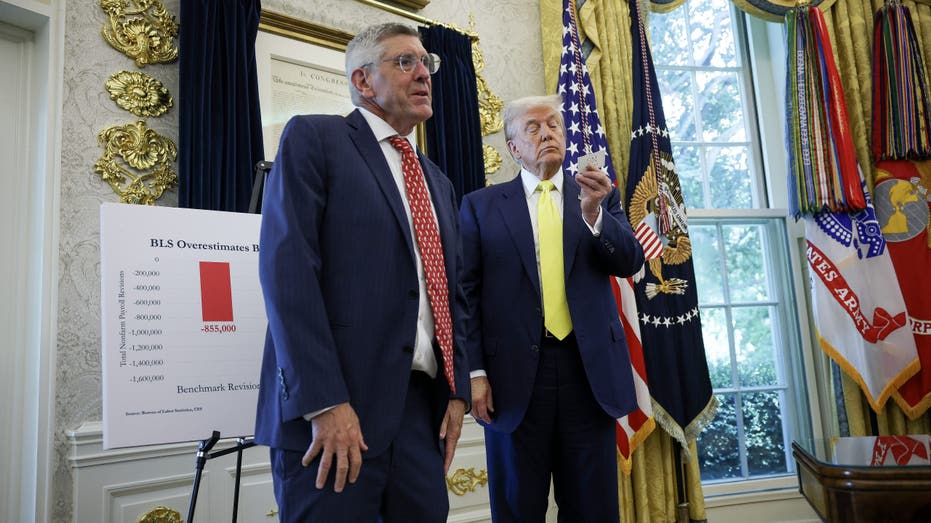Former Trump financial adviser Steve Moore informed ‘Mornings with Maria’ that Democrats are shedding the ‘Schumer Shutdown’ battle, warning the standoff has restricted financial influence however authorities spending poses the true menace to America’s future.
FIRST ON FOX: Former Trump financial advisor and Unleash Prosperity’s Steve Moore has sounded the alarm over a plan by Senators Josh Hawley and Bernie Sanders to cap bank card rates of interest at 10%.
Moore argues that whereas their proposal could also be politically well-liked, it may damage hundreds of thousands of Individuals and urged that President Trump may additionally not assist the measure.
“Trump has a little bit of an economically populist streak,” Moore informed FOX Enterprise. “I do not know his place on this, however I may see him probably saying this isn’t honest to low-income individuals,” he mentioned.
FETTERMAN JOINS FISCAL HAWKS TO SOUND ALARM AS NATIONAL DEBT NEARS STAGGERING $37T
A girl holding bank cards. (iStock / iStock)
In actual fact, in line with Moore, affordability stays a high concern for electoral voters now. “Affordability is and has been subject primary in elections, and I might say that most likely was the problem that drove a giant win for the Democrats on Tuesday,” he added.
In his new report, Why Curiosity Charge Caps Are Dangerous to Shoppers, Moore’s watchdog group highlights the rising disaster of family bank card debt and warns that limiting rates of interest may backfire.
He argues that such bank card legal guidelines would deny hundreds of thousands of lower-income Individuals entry to credit score, whereas main banks to chop rewards applications, increase charges, and tighten eligibility.
TRUMP BLASTS ‘TOO LATE’ POWELL AGAIN, THREATENS LAWSUIT OVER FED’S $3B HQ RENOVATIONS

A bank card is positioned right into a bank card machine for processing funds. (Frederic J. Brown/AFP through Getty Pictures / Getty Pictures)
“There’s a whole lot of speak in Congress about chopping client prices by lowering bank card charges and rates of interest, and after they’ve tried to try this with debit playing cards, it has not labored,” Moore confirmed.
“This is able to deny individuals with decrease credit score rankings entry to credit score and debit playing cards.”
Moore’s report notes that 82% of U.S. households now have not less than one bank card, up from 45% in 1980, exhibiting how entry to credit score has turn out to be a central a part of American life.
With greater than 500 million bank cards in circulation, Moore warns that the proposed cap may undo many years of progress.
“Now 83% of Individuals have not less than one bank card, and most have two or three. That’s been a superb factor for low-income individuals,” he defined.
“However a whole lot of them are going to lose entry to bank cards and factors and different rewards.”
‘THE PANDEMIC’S OVER’: GOP, DEM SENATORS SPAR ON CAMERA OVER COSTLY OBAMACARE SUBSIDIES

Heritage Basis Senior Visiting Fellow for Economics Stephen Moore (L), accompanied by U.S. President Donald Trump, speaks within the Oval Workplace on August 07, 2025, in Washington, DC. (Win McNamee/Getty Pictures)
Moore additional cautioned that the plan would disproportionately hurt these with decrease credit score scores.
“Individuals of decrease incomes usually, not at all times, however usually have decrease credit score scores, so that they’re at greater credit score danger. It’ll get monetary savings for some, sure, however it’s going to deny low-income individuals credit score and that’s not doing them a favor,” he mentioned.
Moore additionally urged Individuals to be extra cautious with debt. “This can be a downside with monetary literacy. Individuals ought to know there are higher methods to borrow than maxing out bank cards.
“It’s a massive downside in America that persons are racking up a whole lot of credit score, so one of many issues we’d like is monetary literacy on this nation and for individuals to know not to try this,” he mentioned.
CLICK HERE TO DOWNLOAD THE FOX NEWS APP
In his report, Moore additionally attracts parallels to previous regulatory failures, equivalent to Illinois’ 36% mortgage cap, warning that new restrictions may “revive loan-sharking” by driving determined debtors towards predatory lenders.
“The system isn’t damaged,” Moore concludes. “However guidelines that make playing cards much less worthwhile and extra susceptible to losses threaten a well-functioning and economically important market.”

